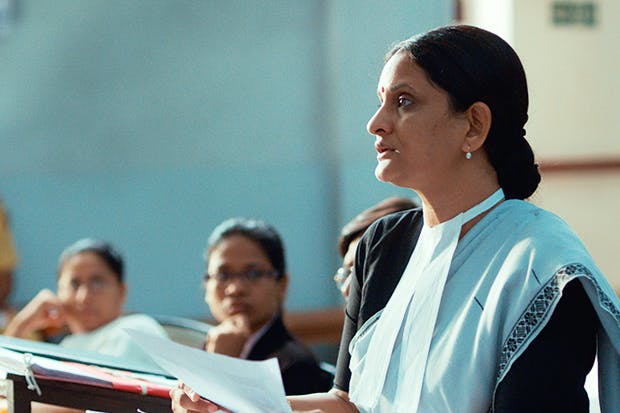The big hitter this week is, of course, Batman v Superman, but if you want to learn something new, and meet characters that’ll stay with you long after, well, get yourself to Court. This is an Indian courtroom drama in which the wheels of justice grind so slowly you’ll want to scream, and now I can see I haven’t sold this well. ‘What do you fancy seeing at the cinema, dear? A courtroom drama in which the wheels of justice grind so slowly you’ll want to scream? Shall I book, or will you?’ But Court’s lassitude is kind of its point. It is one of those film in which not much happens but everything happens. Court is fascinating, affecting and completely engrossing while delivering a devastating critique of a system so antiquated and absurd that a woman is told her case won’t be heard today because she is wearing a sleeveless top.
The film is written and directed by Chaitanya Tamhane, who is 29, which is worrying for those who are, ahem, nearly twice that age and had thought they’d yet to peak. (Damn.) Narratively, it follows the case of Narayan Kamble (Vira Sathidar), a 65-year-old folk singer and political activist who is living in Mumbai and arrested under the Dramatic Performances Act (1876). It’s been alleged that a song he publicly performed drove a sewer worker to commit suicide, and that he is responsible. The charge is patently ridiculous, as is that law, but no one questions it. Even Kamble seems passively resigned.
We follow the trial, which is hopelessly protracted — papers are mislaid, the wrong documents turn up, the police lose and fabricate evidence. A lengthy public holiday comes up, so everything has to wait. Kamble has a lawyer, Vinay Vora (Vivek Gomber), who is from a well-to-do background and is affluent and shops for wine and cheese in western delis. He is not a crusader, but we understand that he has a conscience and this is why he’s not working higher up the food chain. In one instance, he sits on the edge of his bed and weeps with the frustration of it all. Meanwhile, the public prosecutor (Geetanjali Kulkarni) reads out the Victorian-era laws parrot fashion while believing what the judge believes: the law is the law, tradition is tradition, and no one must ever be allowed to break with either. The main characters — including, latterly, the judge (Pradeep Joshi) — are followed home, which adds texture, depth and Vora getting it in the neck from his mother for not being married yet. The old ways are after him, whichever way he turns.
Behind the lens, Tamhane is extraordinarily and wondrously patient. (Damn.) Oftentimes, his camera is allowed simply to sit still, so we can be clear-eyed about what’s happening (or not happening) and often the shot is wide-angled, so we can see what is going on at the periphery, and how these court cases are business as usual for everyone. The camera also lingers long after other directors might have called ‘cut’, which not only amplifies the lack of urgency, but allows us to glimpse what we otherwise might miss. (For example, the woman in the sleeveless top being turned away from the court.) The script is understated and never spells anything out but still we understand; understand that Kamble is an ‘untouchable’ and the system needs to keep him down; that the education system promotes rote learning at the expense of thinking; that social justice will never prevail over procedural issues, even when a law is wildly outdated.
The acting is deliciously naturalistic, with non-actors included in the cast. The widow of the sewage man, for example, is played by the widow of a sewage man, and if you are not profoundly moved by the court appearance of the actual widow of an actual sewage man, your heart is truly made of ice.
Court, which has won umpteen awards on the festival circuit — 16, at my last count — makes you realise that most of the Indian films we see here are about an India viewed through western eyes (The Best Exotic Marigold Hotel, Slumdog Millionaire) whereas this not only offers insight, but feels so real and so true that the chances of you wanting to scream are, I would estimate, zero. I accept it’s one of those films that’ll probably only be playing at an art house cinema somewhere at a time you can’t possibly make, but it will shortly be available on the BFI player. So no excuses, in other words. No excuses at all.
Got something to add? Join the discussion and comment below.
Get 10 issues for just $10
Subscribe to The Spectator Australia today for the next 10 magazine issues, plus full online access, for just $10.














Comments
Don't miss out
Join the conversation with other Spectator Australia readers. Subscribe to leave a comment.
SUBSCRIBEAlready a subscriber? Log in